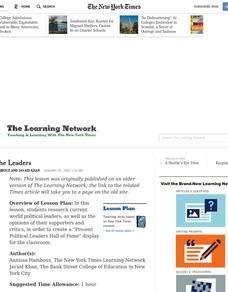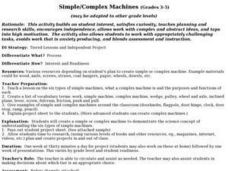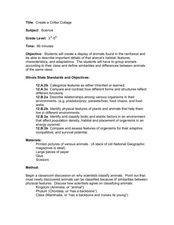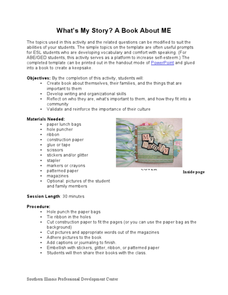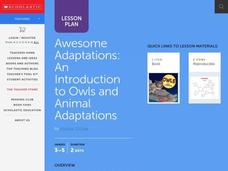Curated OER
Follow the Leaders
Students research current world political leaders, as well as the opinions of their supporters and critics, in order to create a "Present Political Leaders Hall of Fame" display for the classroom.
Curated OER
Fantastic Foods
Students explore the health benefits of dark chocolate. They research other foods which they consider to be both healthy and delicious for a "classroom pantry."
Curated OER
How Are We Different?
Students discuss the differences between boys and girls. In this acceptance instructional activity, students view pictures of boys and girls and use a Venn Diagram to chart their differences. Students discuss boy activities...
Curated OER
The Height of Diplomacy
Students explore issues that might be discussed at the G8 summit meeting hosted by the U.S. after reading and discussing the article "World Leaders Get a Glimpse of America's High Life" from The New York Times. Students work in groups...
Curated OER
Simple/Complex Machines
Students make a simple machine. In this physics activity, students learn about six types of simple machines and the purpose of each and brainstorm examples of simple and complex machines in the classroom. Students create a simple or...
Curated OER
The Amazing Maud Lewis
Students investigate cultural art from Canada by reading about Maud Lewis. In this Canadian history instructional activity, students identify the work of Lewis by visiting her magazine website. Students identify other heroes...
Curated OER
Identification of Career Choices
Student examine gender in career choices. In this career lesson, students are given a list of careers and asked to put them in groups of male. female, and neutral. Students also look through magazines and cut out pictures of people in...
Curated OER
Create a Critter Collage
Students create a collage. In this animal classification lesson, students discuss why and how scientists classify animals. Students view pictures of different animals and decide which class each animal belongs to. Students compare...
Curated OER
Buying on Credit
Students determine how buying on credit adds to the total cost of an item by computing the interest. They find a major item advertised in a magazine and identify the price. Then they identify the rate of a credit card and calculate the...
Curated OER
Hey Diddle Diddle
Students discuss their needs to grow and be healthy. They listen as the teacher explains the definition of "organisms" and "nonliving" Students identify organisms in the classroom. They listen to and view a poster illustrating the "Hey...
Curated OER
The Tropical Rain Forest
Students use various web sites to access information about the rain forest. They use the Tropical Rainforest Interactive CD to make their own rain forest pictures and stories and learn facts about the rain forest. They use various books...
Curated OER
Stonehenge: Solving Ancient Mysteries
Students investigate the mystery of Stonehenge. In this Stonehenge lesson, students participate in a classroom activity that requires them to research information about Stonehenge as well as information regarding archeology and...
Curated OER
Place value concepts
Third graders participate in classroom game to practice place value skills. For this place value lesson, 3rd graders recognize matching digits of the same value. Students record their numerals and their value by writing in standard...
Curated OER
Geographic Features and Human Settlements
Third graders examine geography and settlements. In this geography instructional activity, 3rd graders participate in classroom activities that center on the idea that people settle where there are geographical features that sustain life.
Curated OER
Electoral College
Eleventh graders discover how the Electoral College works. In this presidential elections lesson, 11th graders compare and contrast the Electoral College and popular vote as they participate in a classroom simulation. Students also...
Curated OER
Health Grade 3
Third graders understand what a friend is. In this lesson about friendships, 3rd graders analyze friend and non friend traits. Students learn about relationships through discussion in class. Students gather in groups and look at a list...
Curated OER
Reading and Writing Practice
Young scholars read a magazine article about the advantages and disadvantages of teleworking. They answer questions about the article to test their comprehension. They identify parts of each sentence.
Curated OER
Life...Bring It On!
Eighth graders write their name however they see fit on a poster board. Individually, they write down their strengths that relate to them making important decisions around their name. To end the lesson, they use magazines to find...
Curated OER
What's My Story? A Book About Me
Have your class create keepsake books about themselves. This activity is a presented as a basic idea with minimal justifications or classroom applications. However, with a little effort, this could become a full lesson plan. Add a...
Federal Trade Commission
Ad Awareness
Movie theaters, shopping malls, television, the Internet ... no matter where people go, they are inundated with advertisements. Scholars discuss the topic of ad awareness using the first of four Admongo lessons about advertising. Pupils...
Federal Trade Commission
Ad Creation
How would someone market a new cereal to space aliens? Using the third lesson from a four-part Admongo series on advertising, pupils learn about persuasive techniques companies use to convince consumers to purchase their products. As a...
Scholastic
Awesome Adaptations
Engaged learners discover how an owl beak works and how animals adapt to their environment. This task is part one of a three-part series.
Museum of Disability
Don't Call Me Special
Introduce young learners to the idea of disabilities and making friends with children who are different than they are. Using Don't Call Me Special - A First Look at Disability by Pat Thomas, learners are guided through the new...
National History Day
Challenging the Status Quo: Women in the World War I Military
Why are some so resistant to change? The status quo is often to blame for a lack of forward movement in society. Following the events of World War I, women in America suddenly had a voice—and were going to use it. Scholars use the...
